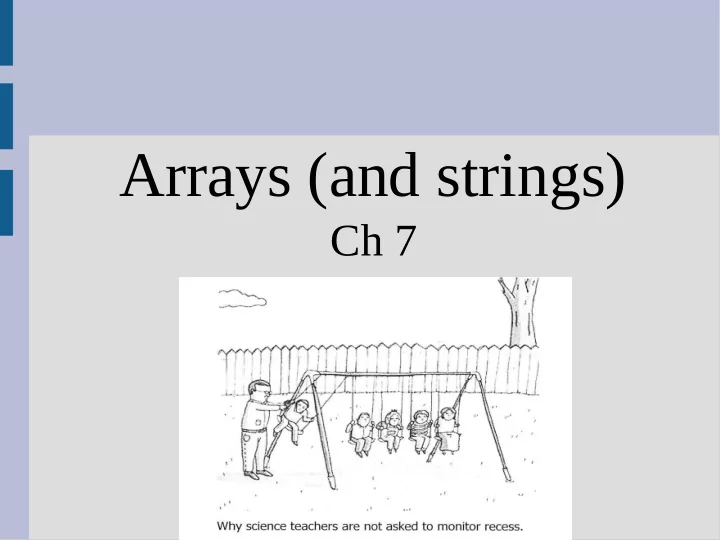

Arrays (and strings) Ch 7
Highlights - arrays - string functions
string We have been using strings to store words or sentences for a while now However, when we type “string x” it does not turn blue, as it is not a fundamental type (like char) strings are basically a grouping of multiple chars together in a single variable
string index String greeting = “Hello”; H e l l o 0 1 2 3 4 The position of a character is called its index. Note that the index starts from zero, not one (this is just to make your life miserable)
string functions String greeting = “Hello”; H e l l o 0 1 2 3 4 greeting.length(); returns value 5 (int) Tells how many characters are in the variable
string concatenation + H e l l o Wo r l d 0 1 2 3 4 0 1 2 3 4 = H e l l o W o r l d 0 1 2 3 4 5 6 7 8 9 String concatenation does not automatically add a space (see: stringConcatenation.cpp)
strings There are also some other useful functions (see book or google for a full list) Some of the more useful ones are: .at(int index): character at the index .find(): finds first character or string .substr(int start): pulls out part of the original string (see: string.cpp)
Arrays Arrays are convenient ways to store similar data types (like multiple chars for a string) Arrays are indexed starting from 0, so index 0 is the first element, index 1 is the second element ... Unlike strings, you can make an array of whatever type you want (any type!)
Arrays - declaration When making an array, you need both a type and a length The format for making an array is below: variable name [] for array, length Type in array of array between
Arrays - elements To access an element of an array, use the variable name followed by the index in [ ] element at index variable name (See: simpleArray.cpp)
Arrays Note that the number in the [ ] is inconsistent: 1. First time (declaration): this is the length 2. All other times: this is the index of a single value inside the array If you want to indicate a whole array, just use the variable name without any [ ] (more on this later)
Arrays - manual initialization Arrays can be initialized by the following: (must be done on declaration line!) If you access outside of your array you will either crash or get a random value You can also use a constant variable to set the size: (See: average.cpp)
Arrays When you make an array, the computer reserves space in memory for the size The array variable is then just a reference to the first element's memory location The computer simply converts the index into an offset from this initial location (see arrayAddress.cpp)
Memory Memory: Code:
Memory (declaration) Memory: #0 (int) x Code:
Memory (declaration) y is the address of y[0] Memory: #0 (int) x #1(int)y[0] #2(int)y[1] #3(int)y[2] Code:
C-Strings and strings There are actually two types of “strings” (multiple characters) in C++ A C-String is a char array, and this is what you get when you put quotes around words C-String A string (the thing you #include) is a more complicated type called a class (few weeks)
C-Strings and strings It is fairly easy to convert between C-Strings and strings: You can also convert between numbers and strings: (see: stringConversion.cpp)
C-Strings and strings C-Strings are basically strings without the added functions You should end C-Strings with null character, as this tells cout when to stop displaying This means you can initialize char arrays with quotes ( BUT NOT OTHER ARRAYS ) (see: cstring.cpp)
Recommend
More recommend